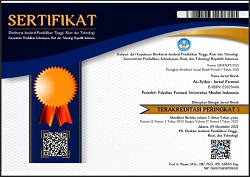PENGARUH INTERVENSI EDUKASI BERBASIS APLIKASI PONSEL PINTAR TERHADAP TINGKAT KUALITAS HIDUP PENDERITA DIABETES MELITUS TIPE 2
Abstract
Keywords
Full Text:
PDF (Bahasa Indonesia)References
WHO Global Report. Global Report on Diabetes. ISBN. 2016; 978:11
International Diabetes Federation. IDF Diabetes Atlas (Tenth Edition). International Diabetes Federation, URL: https://diabetesatlas.org/atlas/tenth-edition/. (2021)
Kemenkes Republik Indonesia. Laporan Hasil Riset Kesehatan Dasar (Riskesdas) Badan Penelitian Dan Pengembangan Kesehatan, URL: https://www.litbang.kemkes.go.id/l aporan-riset-kesehatan-dasar- riskesdas/. (2019)
Ghozali MT, Satibi S, Ikawati Z, Lazuardi L. The Efficient Use of Smartphone Apps to Improve the Level of Asthma Knowledge. J Med Life. 2022; 15(5):625–630
Ghozali MT, Murani CT. Relationship between Knowledge and Medication Adherence among Patients with Tuberculosis: A Cross-Sectional Survey. Bali Medical Journal. 2023; 12(1):158–163
Ghozali MT. Mobile App for COVID-19 Patient Education - Development Process Using the Analysis, Design, Development, Implementation, and Evaluation Models. Nonlinear Engineering. 2022; 11(1):549–557
Larasati T. Kualitas Hidup Pasien Diabetes Melitus Tipe 2 di RS Abdul Moeloek Propinsi Lampung. JUKE Unila.; 2(1):17-20
Faridah I et al. Pengaruh Model Aplikasi Control Diabetes Mellitus Type 2 (CDMT2) Terhadap Kualitas Hidup Pada Pasien Diabetes Mellitus Tipe 2. Interest : Jurnal Ilmu Kesehatan. 2020; 9(2):220–225
Burroughs TE et al. Development and Validation of the Diabetes Quality of Life Brief Clinical Inventory. Diabetes Spectrum. 2004; 17(1):41–49
Chusmeywati V. Hubungan Dukungan Keluarga Terhadap Kualitas Hidup Penderita Diabetes Melitus di RS PKU Muhammadiyah Yogyakarta Unit II (Skripsi). Yogyakarta: Program Studi Ilmu Keperawatan Fakultas Kedokteran Dan Ilmu Kesehatan. 2016
Milita F et al. Kejadian Diabetes Mellitus Tipe II Pada Lanjut Usia Di Indonesia (Analisis Riskesdas 2018). Jurnal Kedokteran dan Kesehatan. 2021; 17(1):9–20
Arania R, Triwahyuni T, Prasetya T, Cahyani SD. Hubungan Antara Pekerjaan dan Aktivitas Fisik Dengan Kejadian Diabetes Mellitus di Klinik Mardi Waluyo Kabupaten Lampung Tengah. Jurnal Medika Malahayati. 2021; 5(3):163–169
Rahmi AS, Syafrita Y, Susanti R. Hubungan Lama Menderita DM Tipe 2 dengan Kejadian Neuropati DiabetiK. Jambi Medical Journal ‘Jurnal Kedokteran dan Kesehatan’. 2022; 10(1):20–25
Fatima U, Sherwani R, Khan T, Zaheer S. Foetal Autopsy-Categories and Causes of Death. J Clin Diagn Res. 2014; 8(10):FC05
Erniantin D et al. Gambaran Kualitas Hidup Penderita Diabetes Melitus pada Anggota dan Non Anggota Komunitas Diabetes di Puskesmas Ngrambe. Jurnal Kesehatan Masyarakat. 2018; 6(1):215–224
Andrich D, Foronda C. Improving Glycemic Control and Quality of Life with Diabetes Self-Management Education: A Pilot Project. J Contin Educ Nurs. 2020; 51(3):119–123
Wahyuni KI, Rohmah MK, Setyawati H. Evaluasi Edukasi Personal Dalam Pemahaman, HBA1c Dan Kualitas Hidup Pasien DM Tipe 2 Di Sidoarjo. Jurnal Pharmascience. 2021; 8(1):132
DOI: https://doi.org/10.56711/jifa.v15i2.1032
Refbacks
- There are currently no refbacks.
Indexed by:
ISSN: 2085-4714 | e-ISSN: 2502-9444
Editor's Address:
Faculty of Pharmacy, Univeristas Muslim Indonesia
2nd Campus of UMI: Jl. Urip Sumoharjo km. 5 , Makassar, South Sulawesi, Indonesia
E-mail: jurnal.farmasi@umi.ac.id















